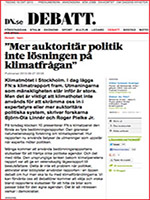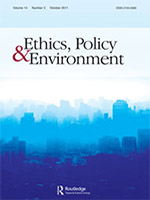Boykoff, M. T. and S. K. Olson (2013). ‘Wise contrarians’: a keystone species in contemporary climate science, politics and policy. Celebrity Studies 4 (3) 276-291, doi: 10.1080/19392397.2013.831618, Published October 25. [pdf].
 Abstract: In the 1980s, celebrity climate contrarians, which we might understand as a kind of ‘keystone species’ or ‘charismatic megafauna’, emerged through resistance to dominant interpretations of scientific evidence, and through divergent views regarding what are the best ways to respond to climate threats. Our research here examines the growth pathways of these beings through historical accounts of the ‘Wise Use’ movements rooted in the United States (US) West, as well as interview data and participant observations at the 2011 Heartland Institute’s Sixth International Conference on Climate Change, and through tracking of media coverage of climate change and contrarian think tanks over the last 25 years. This contribution helps to better understand celebrity climate contrarians embedded in countermovement activities through a threefold analysis: of the motivations that prop up these contrarian stances, such as ideological or evidentiary disagreement to the orthodox views of science (also known as scientific consensus); the drive to fulfil the perceived desires of special interests (for example, carbon-based industry); and the exhilaration from self-perceived academic martyrdom and the more general desire for notoriety. In these ways, celebrity is a vehicle for influence, and influence is vital to decision-making within the dynamic architectures of contemporary climate science, politics and policy. Read more ... Abstract: In the 1980s, celebrity climate contrarians, which we might understand as a kind of ‘keystone species’ or ‘charismatic megafauna’, emerged through resistance to dominant interpretations of scientific evidence, and through divergent views regarding what are the best ways to respond to climate threats. Our research here examines the growth pathways of these beings through historical accounts of the ‘Wise Use’ movements rooted in the United States (US) West, as well as interview data and participant observations at the 2011 Heartland Institute’s Sixth International Conference on Climate Change, and through tracking of media coverage of climate change and contrarian think tanks over the last 25 years. This contribution helps to better understand celebrity climate contrarians embedded in countermovement activities through a threefold analysis: of the motivations that prop up these contrarian stances, such as ideological or evidentiary disagreement to the orthodox views of science (also known as scientific consensus); the drive to fulfil the perceived desires of special interests (for example, carbon-based industry); and the exhilaration from self-perceived academic martyrdom and the more general desire for notoriety. In these ways, celebrity is a vehicle for influence, and influence is vital to decision-making within the dynamic architectures of contemporary climate science, politics and policy. Read more ...
Hale, B. (forthcoming). Polluting and Unpolluting. Environmental Ethics, 2nd Edition. Ed. Michael Boylan. Wiley -Blackwell. [pdf].
 Excerpt: The question for our paper relates to the wrong of pollution, or by extension, the wrong of environmental damage. Does the wrong of pollution consist fundamentally in the harm-causing effects of sullying some environment? Or is there something more? Read more ... Excerpt: The question for our paper relates to the wrong of pollution, or by extension, the wrong of environmental damage. Does the wrong of pollution consist fundamentally in the harm-causing effects of sullying some environment? Or is there something more? Read more ...
Linnér, B. and R. A. Pielke, Jr., 2013. More Authoritarian Politics is Not the Solution to Climate Change (english version). Dagens Nyheter, September 27. [website].
 Excerpt: On Thursday the Intergovernmental Panel on Climate Change presented the first of four assessments, this one taking stock of the physical science of the climate system. The report’s reception and promotion highlight challenges that arise when expertise meets politics. Excerpt: On Thursday the Intergovernmental Panel on Climate Change presented the first of four assessments, this one taking stock of the physical science of the climate system. The report’s reception and promotion highlight challenges that arise when expertise meets politics.
The temptation to use the conclusions to forward different political agendas will be abundant. And rightly so, the initial idea behind the IPCC report was to provide an assessment of science that could be used by policy-makers. This is clearly not a problem when politicians, activists or lobbyists use the report in an open debate on how to address climate change. Read more ... |
Pielke, R.A. Jr. (2013). After Haiyan: how to act on scientific advice that’s politically inconvenient? The Guardian, Nov. 19. [website].
 Excerpt: The proposal, advanced by the G77 plus China, that the US and other nations should pay tens or even hundreds of billions of dollars to poor countries that suffer disasters, is a central theme of the climate negotiations now taking place in Warsaw, Poland. Excerpt: The proposal, advanced by the G77 plus China, that the US and other nations should pay tens or even hundreds of billions of dollars to poor countries that suffer disasters, is a central theme of the climate negotiations now taking place in Warsaw, Poland.
It’s an idea that has been made more tangible by the tragic loss of life and devastation in the Philippines caused by super typhoon Haiyan, one of the most powerful observed storms of recent decades. Read more Read more ...
Pielke, R.A., Jr. (2013). Behind Japan’s Climate Fail: Nuclear Energy and Global Warming Commitments. The Breakthrough Institute Blog, November 21. [website].
 Excerpt: The Japanese government announced last week its adoption of a new emissions reductions target: 3.8 percent by 2020 from 2005 levels. This figure is a setback from an earlier target of reducing emissions by 25 percent from 1990 to 2020, part of a policy called “mamizu” that was criticized as being not ambitious enough, when in reality it would have been very difficult to achieve. The new target shows how Japan has once again implemented “mamizu” policies: in 2010, prior to the Fukushima nuclear disaster, Japan got 18.5 percent of its total energy consumption from carbon-free sources. In 2012, it was 6.4 percent. Read more ... Excerpt: The Japanese government announced last week its adoption of a new emissions reductions target: 3.8 percent by 2020 from 2005 levels. This figure is a setback from an earlier target of reducing emissions by 25 percent from 1990 to 2020, part of a policy called “mamizu” that was criticized as being not ambitious enough, when in reality it would have been very difficult to achieve. The new target shows how Japan has once again implemented “mamizu” policies: in 2010, prior to the Fukushima nuclear disaster, Japan got 18.5 percent of its total energy consumption from carbon-free sources. In 2012, it was 6.4 percent. Read more ...
Ethics, Policy & Environment. [website].
 The winter issue of Ethics, Policy, & Environment (co-edited by CSTPR’s Benjanim Hale and George Mason University’s Andrew Light) is now out. The winter issue of Ethics, Policy, & Environment (co-edited by CSTPR’s Benjanim Hale and George Mason University’s Andrew Light) is now out.
This issue includes a Target article by Mark Sagoff, with commentaries from Rachel Fredericks, Carl Safina, Simon James and others, as well as feature articles on climate justice, conservation through commodification, and precautionary principle. Read more ...
|







